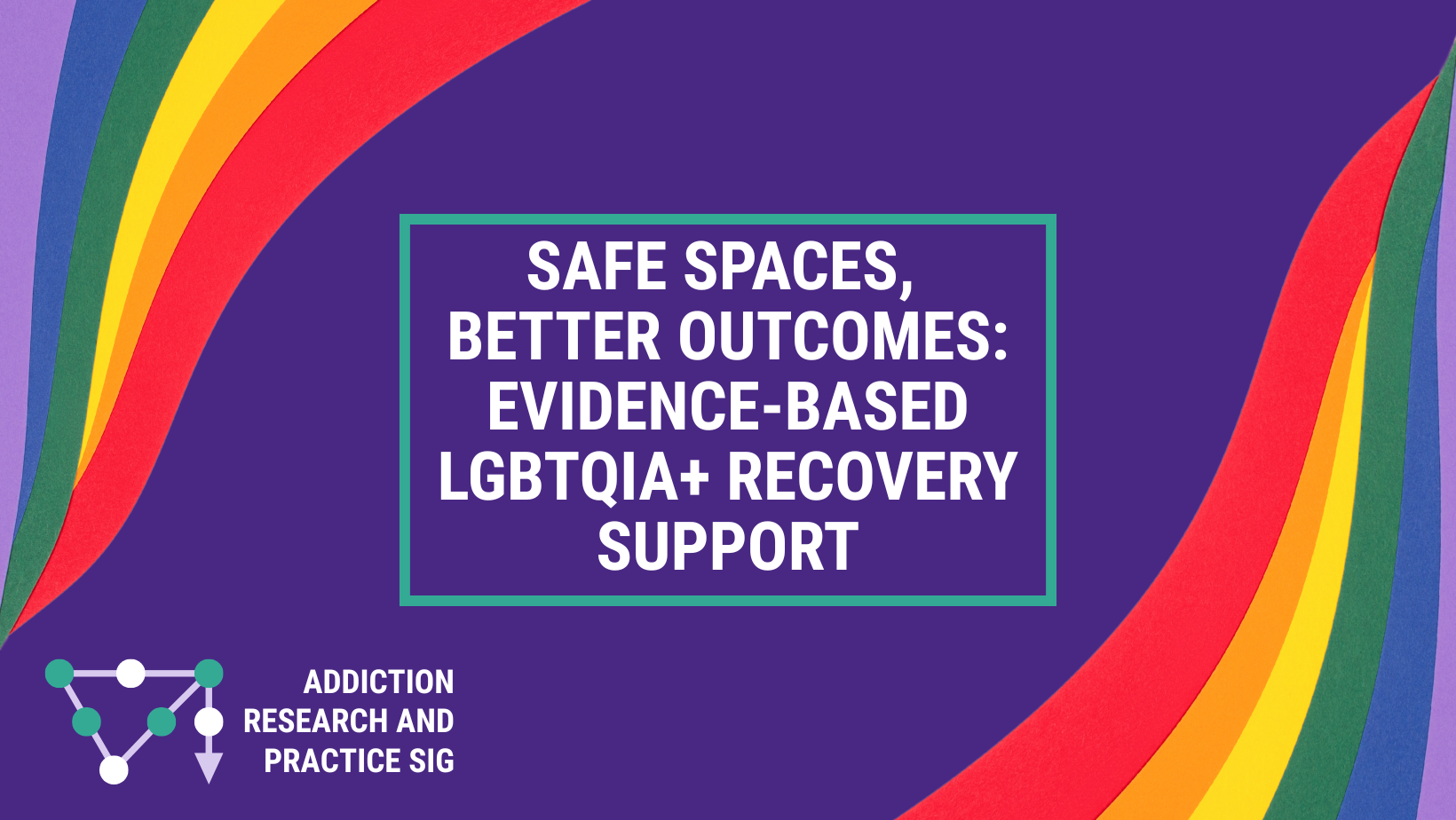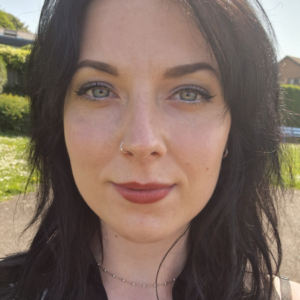

Written by Shannon Murray, a Senior Research Assistant in the Substance Use Research Group (SURG) at the University of South Wales
This is a blog post written by Shannon Murray, a member of the Addiction Special Interest Group (SIG). For more information about the SIG, including upcoming dates and how to join, please visit this page or click below.
This Pride Month, we celebrate not only love and the expression of identity but also the remarkable resilience of LGBTQIA+ communities in tackling challenges related to substance use. LGBTQIA+ individuals face substance use issues at rates two to three times higher than the rest of the population - a disparity driven by minority stress, discrimination, and societal barriers (Murray et al., 2024). However, 2025 brings hope through innovative programmes, increased funding, and a growing recognition of LGBTQIA+-affirming care.
Understanding the landscape
UK research paints a clear picture of disparity: LGBTQIA+ people use illicit drugs at significantly higher rates than the rest of the population. The numbers tell the story, while 8.8% of adults aged 16-59 reported drug use nationally in the past year (ONS, 2024), gay and bisexual adults are nearly four times more likely to have used illicit drugs (Crime Survey for England & Wales, 2022). Cannabis leads as the most commonly used substance, with ecstasy and powder cocaine following.
Recent research from the University of South Wales found that among LGBTQIA+ participants, “cannabis (83%), ecstasy (68%), and cocaine (67%) were commonly used substances” (Murray et al., 2024). The study revealed that many respondents highlighted "stigma" and peer pressure within LGBTQIA+ communities as motivators for substance use, with participants expressing a preference for informal support due to fears of discrimination from formal treatment services.
Bisexual individuals face the highest risk across all categories of substance use, while transgender people encounter additional barriers in healthcare settings, with 32% experiencing discrimination when seeking treatment (Bachmann & Gooch, 2018). Fear of judgement leads many to avoid formal treatment entirely, opting for informal support networks instead of professional services.
These disparities stem from what researchers refer to as minority stress - the chronic strain of dealing with discrimination, concealing identity, and facing rejection (Meyer, 2003). When society prevents individuals from expressing their identity, substances often serve as a coping mechanism (Murray et al., 2024).

Credit: Michal Rosak | Pexels
Key findings from recent research
My recent study with LGBTQIA+ individuals in the UK identified several critical barriers to accessing support (Murray et al., 2024). Participants highlighted their fear of homophobia and discrimination from service providers as a significant concern, alongside the absence of LGBTQIA+-specific services within the drug treatment landscape. The research also underscored the need for dedicated LGBTQIA+ staff in drug services and the importance of visibility at LGBTQIA+ community events to foster trust and improve accessibility.
Reasons for hope
The tide is turning. UK organisations, such as the LGBT Foundation, now provide comprehensive recovery programmes specifically for LGBTQIA+ individuals in Greater Manchester and Liverpool (LGBT Foundation, 2023). London Friend's Antidote service - the UK's first drug service to address chemsex - continues to expand support with trained LGBTQIA+ staff who understand community-specific pressures (London Friend, 2024).
The NHS has increasingly recognised the need for culturally competent care, with 310,863 adults accessing drug and alcohol treatment services in 2023-24 - the highest number since 2009-10. Organisations like Galop provide specialist support for LGBTQIA+ individuals experiencing abuse and violence, addressing the underlying trauma that often contributes to substance use (Office for Health Improvement and Disparities, 2024; NHS England, 2024; Galop, 2023).
Recommendations for professionals working with LGBTQIA+ individuals
Based on current research and best practice, services should:
1. Create inclusive environments:
- Display rainbow flags and LGBTQIA+ affirming materials
- Use inclusive language on intake forms and documentation
- Implement clear non-discrimination policies
- Train all staff in LGBTQIA+ cultural competency
2. Improve accessibility:
- Offer LGBTQIA+-specific support groups
- Employ openly LGBTQIA+ staff where possible
- Partner with LGBTQIA+ community organisations
- Provide outreach in commercial LGBTQIA+ venues and events

Credit: Alexander Grey | Pexels
Moving forward together
This Pride Month, we honour the struggles and triumphs of LGBTQIA+ individuals in recovery. Community connection remains an incredible strength; from peer-led recovery groups to Pride celebrations themselves, research indicates that affirming community support significantly reduces the risks associated with substance use.
The evidence is clear: when LGBTQIA+ individuals receive competent, respectful care that addresses minority stress alongside addiction, recovery flourishes. Work being done throughout the UK is growing – for example, the ‘KinderStrongerBetter’ campaign in Glasgow, where peers collaborated to create harm reduction resources for Scotland's LGBTQI+ community (KinderStrongerBetter, 2020). This group of LGBTQIA+ community members and professionals came together with shared experiences of using drugs and alcohol or being impacted by loved ones' use, creating resources based on what they wished someone had told them.
As we celebrate Pride 2025, we are building a future where every LGBTQIA+ person has access to affirming, life-saving support and treatment. Pride encompasses the celebration of identity, which involves supporting one another through every challenge, including recovery from substance use.
Essential UK support services
National helplines:
- Switchboard (LGBTQIA+ support): 0800 0119 100 - (https://switchboard.lgbt)
- LGBT Foundation Helpline: 0345 3 30 30 30 - (https://lgbt.foundation)
- Talk to Frank (drug advice): 0300 123 6600 - (https://talktofrank.com)
- Samaritans (24/7 crisis support): 116 123 - (https://samaritans.org)
Specialist LGBTQIA+ services:
- London Friend Antidote (drugs & alcohol): (https://londonfriend.org.uk/antidote)
- LGBT Foundation Recovery Programme: (https://lgbt.foundation/help/recovery-programme)
- Galop (LGBTQIA+ anti-abuse charity): 0207 704 2040 – (https://galop.org.uk)
Wales-specific services:
- LGBT+ Cymru Helpline: 01792 650777 - (https://lgbtcymru.org.uk)
- Umbrella Cymru: (https://umbrellacymru.co.uk)
- Stonewall Cymru: (https://stonewallcymru.org.uk)
- Progress Cymru Counselling: (https://lgbtcymru.org.uk)
- Welsh Government Substance Misuse: (https://gov.wales/substance-misuse)
References:
- Bachmann, C. L., & Gooch, B. (2018). LGBT in Britain Health Report. Stonewall.
- Crime Survey for England & Wales. (2022). Drug misuse statistics. Home Office.
- Galop. (2024). Support services. London: Galop. Retrieved from https://galop.org.uk/get-help/support-services/
- KinderStrongerBetter. (2020). #KinderStrongerBetter Campaign Report. Glasgow: Glasgow LGBTQI Substance Use Partnership. Retrieved from https://kinderstrongerbetter.org
- LGBT Foundation. (2023). Impact Report 2023. Manchester: LGBT Foundation. Retrieved from https://lgbt.foundation/help/recovery-programme/
- London Friend. (2024). Antidote: Drugs & Alcohol Support Service Description. London: London Friend. Retrieved from https://londonfriend.org.uk/antidote/
- Meyer IH. Prejudice, social stress, and mental health in lesbian, gay, and bisexual populations: conceptual issues and research evidence. Psychol Bull. 2003 Sep;129(5):674-697. doi: 10.1037/0033-2909.129.5.674. PMID: 12956539; PMCID: PMC2072932.
- Murray, S., Holloway, K., & Buhociu, M. (2024). "It's called homophobia, baby", exploring LGBTQIA+ substance use and treatment experiences in the UK. Drugs: Education, Prevention and Policy, 31(5), 505–515.
- NHS England. (2024). LGBT+ health. NHS England. Retrieved from https://www.england.nhs.uk/about/equality/equality-hub/patient-equalities-programme/lgbt-health/
- Office for Health Improvement and Disparities. (2024, November 28). Adult substance misuse treatment statistics 2023 to 2024: report. UK Government. Retrieved from https://www.gov.uk/government/statistics/substance-misuse-treatment-for-adults-statistics-2023-to-2024/adult-substance-misuse-treatment-statistics-2023-to-2024-report
- ONS (2024). Drug misuse in England and Wales: year ending March 2024. Office for National Statistics.
